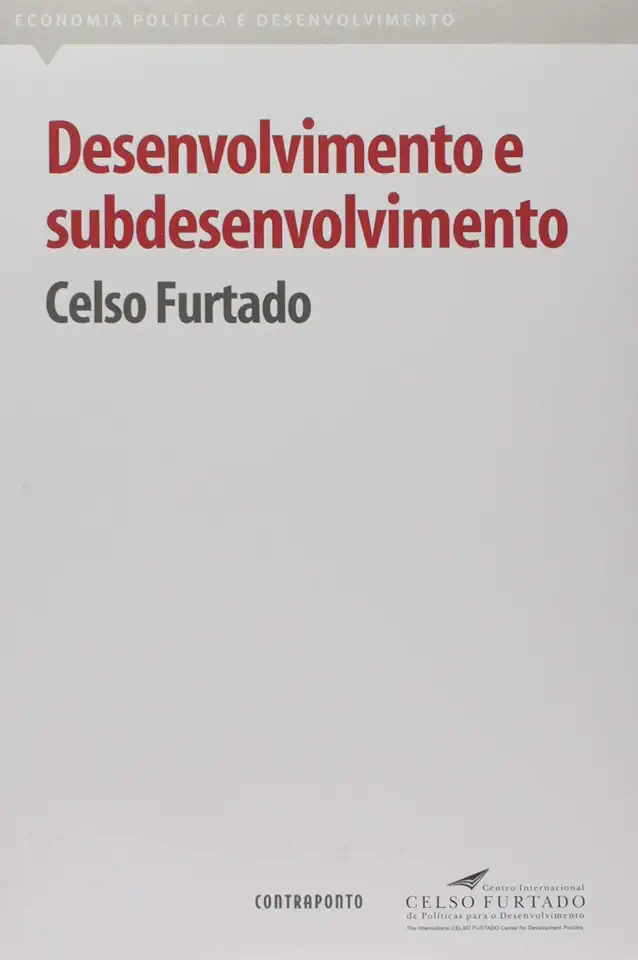
Development and Underdevelopment - Celso Furtado
Development and Underdevelopment: A Structuralist Perspective
Introduction
In his seminal work, "Development and Underdevelopment," Celso Furtado presents a comprehensive analysis of the economic disparities between developed and underdeveloped countries. Furtado argues that underdevelopment is not simply the result of a lack of resources or capital, but rather a consequence of structural factors inherent in the global economic system. He offers a powerful critique of traditional modernization theories and proposes an alternative framework for understanding and addressing the challenges of economic development.
Structuralist Theory of Development
Furtado's structuralist theory of development is based on the premise that the global economy is characterized by a center-periphery structure. Developed countries, located at the center, dominate the economic system and extract resources and wealth from underdeveloped countries, located at the periphery. This unequal relationship perpetuates underdevelopment and hinders the economic growth of peripheral countries.
Furtado identifies several key structural factors that contribute to underdevelopment, including:
- Monoculture and Dependency: Underdeveloped countries are often dependent on a single export commodity, making them vulnerable to fluctuations in global prices and susceptible to exploitation by multinational corporations.
- Lack of Industrialization: Underdeveloped countries lack the industrial infrastructure and technological capacity to diversify their economies and create sustainable growth.
- Inequitable Land Distribution: Unequal land distribution and concentration of land ownership in the hands of a few elites hinder agricultural development and perpetuate rural poverty.
- External Debt: Underdeveloped countries are often burdened by external debt, which diverts resources away from productive investment and further deepens their dependence on developed countries.
Critique of Modernization Theory
Furtado's structuralist theory stands in stark contrast to modernization theory, which was dominant in development discourse during the mid-20th century. Modernization theory argued that underdeveloped countries could achieve development by following the same path as developed countries, through industrialization, urbanization, and the adoption of Western values and institutions.
Furtado critiques modernization theory for ignoring the structural barriers that prevent underdeveloped countries from replicating the development experiences of developed countries. He argues that the global economic system is rigged in favor of developed countries and that underdeveloped countries need to adopt alternative strategies for achieving economic development.
Alternative Strategies for Development
Furtado proposes several alternative strategies for development, including:
- Import Substitution Industrialization: Underdeveloped countries should prioritize the development of domestic industries to reduce their dependence on imports and promote economic diversification.
- Land Reform: Equitable land distribution is essential for agricultural development and reducing rural poverty.
- Regional Integration: Underdeveloped countries should form regional alliances to strengthen their bargaining power in the global economy and reduce their vulnerability to external shocks.
- South-South Cooperation: Underdeveloped countries should cooperate with each other to share knowledge, resources, and technology, and to challenge the dominance of developed countries in the global economic system.
Conclusion
"Development and Underdevelopment" is a seminal work that offers a profound critique of traditional development theories and provides a compelling alternative framework for understanding and addressing the challenges of economic development. Furtado's structuralist analysis sheds light on the deep-rooted causes of underdevelopment and offers practical strategies for achieving more equitable and sustainable development. This book is a must-read for anyone interested in development economics, global inequality, and the search for a more just and sustainable world.
Enjoyed the summary? Discover all the details and take your reading to the next level — [click here to view the book on Amazon!]